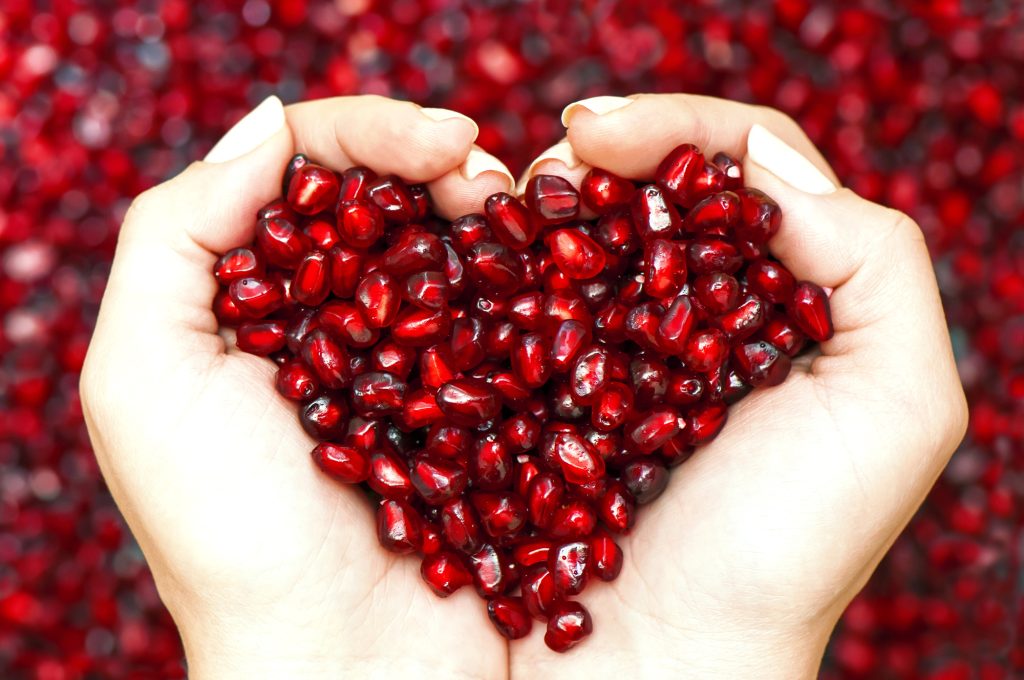The pomegranate, a symbol of prosperity, hope, and abundance for over four thousand years, has deeply influenced culture and history. Often depicted in art and literature, it is even suggested by some scholars that the forbidden fruit eaten by Eve in the Garden of Eden was a pomegranate, not an apple.
Research into pomegranates (Punica granatum) has increasingly focused on their health benefits, particularly due to key compounds like polyphenols and punicalagins. These compounds have shown promise in addressing issues such as cancer, cardiovascular issues, liver diseases, and inflammation. 1, 2,3,4
Pomegranates are rich in bioactive phenolic compounds such as ellagitannins, anthocyanins, and flavanols. 5 Among these, punicalagins are a significant component, but they need to be transformed by gut bacteria to become biologically active.6 Several studies have shown that pomegranate extract can improve gut microbiota, suggesting that it may serve as a valuable prebiotic for enhancing human health.7,8,9
In the context of aging, these compounds may offer benefits by being converted into active forms that can cross the blood-brain barrier, potentially aiding brain health and overall well-being in older adults.
A recent study has shown that POMANOX®, a potent pomegranate extract from Euromed, offers significant health benefits. This extract, known for its cardiovascular, metabolic, skin, mood, and overall health support, was found to reverse motor coordination loss and prevent oxidative stress in an independent mouse study conducted by the University of Valencia, Spain.10 POMANOX® is standardized to 30% punicalagins, which is the highest concentration among pomegranate extracts.
In the study, pomegranate extract was found to prevent frailty, enhance motor skills, and reduce oxidative stress in the cerebellum, which is the brain region responsible for coordination. The researchers focused on factors related to balance and stance, which are controlled by the cerebellum.
The study found that after four months of pomegranate extract supplementation, elderly mice had stable antioxidant levels, which are important for healthy brain functioning. The cerebellum, a brain area responsible for coordinating movements, learning new skills, and cognitive tasks, tends to decline with age, leading to more falls and accidents.
For the first time, researchers observed that the cerebellum shows early signs of aging in a model without disease. This study highlights the potential of pomegranate extract to help prevent normal age-related decline in brain function.
According to the researchers, the standardized pomegranate extract affected gene expression related to the apoptosis pathway, which is linked to healthy aging. They found that the extract influenced genes involved in apoptosis, as confirmed by changes in the expression of caspase 3, 8, and 9. This aligns with previous findings that centenarians have better control over apoptosis compared to individuals with typical aging.11
The study suggests that apoptosis plays a key role in healthy aging. Although the extract did not impact grip strength or endurance, it did improve motor skills, coordination, and neuromuscular function, and helped prevent age-related weight loss.
Frailty, a condition marked by slow gait, difficulty standing up, weight loss, and general weakness, can lead to disability and reduced quality of life. The research team uses the Valencia test to apply human findings to animal models, which has enabled them to quantify age-related frailty in laboratory mice.
Conclusion
Traditional herbal remedies are widely accepted in complementary and alternative medicine. Punicalagin, a compound found in pomegranates, has shown promising neuroprotective effects in pre-clinical research and has been shown to possess antioxidant, anti-inflammatory, anti-viral, anti-proliferative, prebiotic, and anti-cancer properties.12
Key Take-Away
Given this evidence, pomegranate extract may be a valuable tool for promoting healthy aging. As research continues to support these benefits, practitioners should consider these findings when developing effective treatments.
1. Adams L.S., Seeram N.P., Aggarwal B.B., Takada Y., Sand D., Heber D. Pomegranate Juice, Total Pomegranate Ellagitannins, and Punicalagin Suppress Inflammatory Cell Signaling in Colon Cancer Cells. J. Agric. Food Chem. 2006;54:980–985. doi: 10.1021/jf052005r.
2. Cao Y., Chen J., Ren G., Zhang Y., Tan X., Yang L. Punicalagin Prevents Inflammation in LPS-Induced RAW264.7 Macrophages by Inhibiting FoxO3a/Autophagy Signaling Pathway. Nutrients. 2019;11:2794. doi: 10.3390/nu11112794.
3. Zhang Y., Tan X., Cao Y., An X., Chen J., Yang L. Punicalagin Protects against Diabetic Liver Injury by Upregulating Mitophagy and Antioxidant Enzyme Activities. Nutrients. 2022;14:2782. doi: 10.3390/nu14142782.
4. Alalawi S., Albalawi F., Ramji D.P. The Role of Punicalagin and Its Metabolites in Atherosclerosis and Risk Factors Associated with the Disease. Int. J. Mol. Sci. 2023;24:8476. doi: 10.3390/ijms24108476.
5. Venusova E, Kolesarova A, Horky P, Slama P. Physiological and Immune Functions of Punicalagin. Nutrients. 2021; 13(7):2150. https://doi.org/10.3390/nu13072150
6. Caballero V, Estévez M, Tomás-Barberán FA, Morcuende D, Martín I, Delgado J. Biodegradation of Punicalagin into Ellagic Acid by Selected Probiotic Bacteria: A Study of the Underlying Mechanisms by MS-Based Proteomics. J Agric Food Chem. 2022;70(51):16273-16285. doi:10.1021/acs.jafc.2c06585
7. Li Z, Summanen PH, Komoriya T, et al. Pomegranate ellagitannins stimulate growth of gut bacteria in vitro: Implications for prebiotic and metabolic effects. Anaerobe. 2015;34:164-168. doi:10.1016/j.anaerobe.2015.05.012
8. Sivamani RK, Chakkalakal M, Pan A, Nadora D, Min M, Dumont A, Burney WA, Chambers CJ. Prospective Randomized, Double-Blind, Placebo-Controlled Study of a Standardized Oral Pomegranate Extract on the Gut Microbiome and Short-Chain Fatty Acids. Foods. 2024; 13(1):15. https://doi.org/10.3390/foods13010015
9. O’Flaherty S, Cobian N, Barrangou R. Impact of Pomegranate on Probiotic Growth, Viability, Transcriptome and Metabolism. Microorganisms. 2023;11(2):404. Published 2023 Feb 5. doi:10.3390/microorganisms11020404
10. Verdú D, Valls A, Díaz A, Carretero A, Dromant M, Kuligowski J, Serna E, Viña J. Pomegranate Extract Administration Reverses Loss of Motor Coordination and Prevents Oxidative Stress in Cerebellum of Aging Mice. Antioxidants. 2023; 12(11):1991. https://doi.org/10.3390/antiox12111991
11. Borras C., Abdelaziz K.M., Gambini J., Serna E., Inglés M., de la Fuente M., Garcia I., Matheu A., Sanchís P., Belenguer A., et al. Human Exceptional Longevity: Transcriptome from Centenarians Is Distinct from Septuagenarians and Reveals a Role of Bcl-xL in Successful Aging. Aging (Albany NY) 2016;8:3185–3208. doi: 10.18632/aging.101078.
12. Siddiqui, N., Saifi, A., Chaudhary, A. et al. Multifaceted Neuroprotective Role of Punicalagin: A Review. Neurochem Res 49, 1427–1436 (2024). doi.org/10.1007/s11064-023-04081-w






